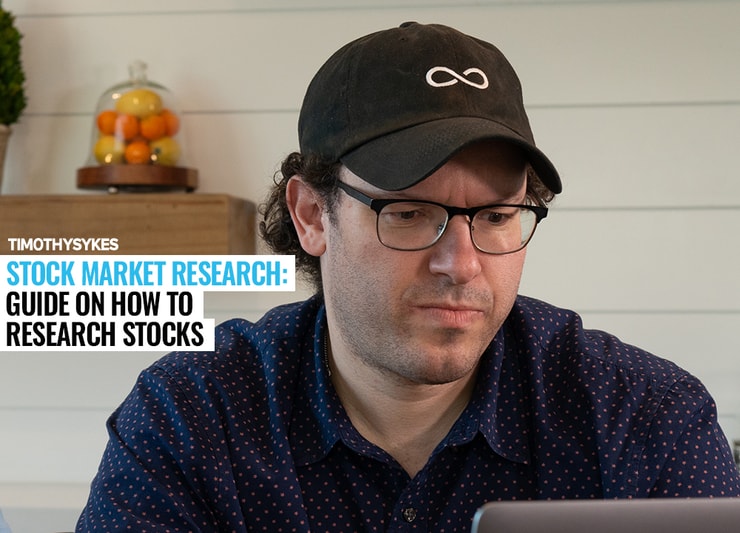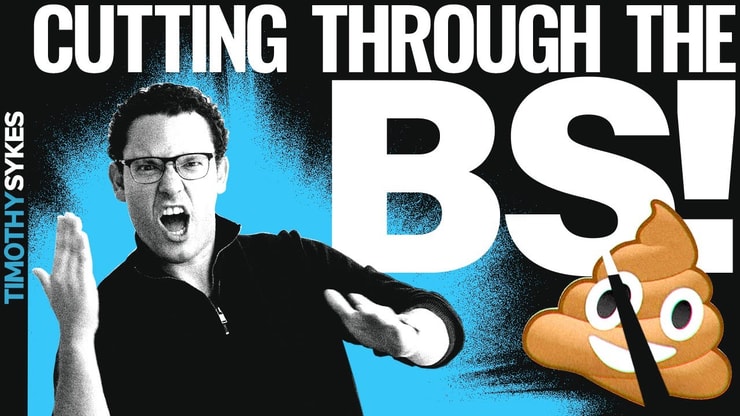Stock market research is a must before you make a single trade.
You wouldn’t buy a car or a house without checking it out first. Many of us don’t even buy something as simple as a toaster without researching it first.
The stocks you trade are far more important — because your trading can potentially buy you the car and house (and toaster) of your dreams.

There’s no way around it: If you want any remote chance of succeeding as a trader, you’ve gotta learn to love research.
Stock market research has proven very useful to me and many of my students, and you’re making a smart choice by learning about it.
Here’s what you need to know…
Table of Contents
- 1 What’s Stock Market Research?
- 2 What Information Should You Research Before You Trade?
- 3 How to Find Information About a Company’s Stock
- 4 How to Properly Do Stock Market Research
- 4.1 Stock Market Research Tip #1: Research on the Company, Interest
- 4.2 Stock Market Research Tip #2: Technical Analysis
- 4.3 Stock Market Research Tip #3: Top Tools
- 4.4 Stock Market Research Tip #4: Look for Great Stock Market Indicators
- 4.5 Stock Market Research Tip #5: Importance of Stock Valuation
- 4.6 Stock Market Research Tip #6: Company Balance Sheet
- 4.7 Stock Market Research Tip #7: Earnings Report
- 4.8 Stock Market Research Tip #8: Keep Improving Your Knowledge
- 4.9 Apply For My Trading Challenge
- 5 3 Top Stock Market Research Sites (Updated 2021)
- 6 The Bottom Line on Stock Market Research
What’s Stock Market Research?

Long story short, effective stock market research is digging deep for everything you can learn about a company and its stock.
The type of research you do will depend on your strategy and whether you’re day trading or swing trading. The longer you plan to hold a stock, the more company research you have to do.
A share of stock is a piece of ownership in a business. Here are some stock market research questions to ask yourself if you plan to hold a stock long term:
- How well is the company performing?
- What does it sell?
- How well are its products performing in the marketplace?
- What is its growth potential or competition?
You also need to look at the stock as a financial instrument…
- Is its current market price historically high or low?
- How is it trending — up or down?
- What are the price/earnings ratio and other financial indicators?
Those are just some of the questions you need to answer to perform fundamental analysis of a stock.
I always assume the penny stocks I trade will fail. But you can potentially make a lot of money from trading their ups and downs. For me, that volatility is the most exciting form of day trading.
Importance of Stock Market Research
If you want something done right, do it yourself. You need to perform your own stock research. Never take what anybody else says at face value. When it comes to penny stocks, most chat room promoters pump stocks for their own benefit.
Knowledge is power … and in the stock market, it can be the difference between making money and losing it.
What Information Should You Research Before You Trade?

I gave you some information to find out about a company before you swing trade. When it comes to day trading, you want to ask yourself different questions:
- What’s the catalyst moving the stock?
- What’s the pattern?
- Is the stock a former runner?
- What’s the volume?
- Is there stock dilution? If so, at what price?
Because I only hold a company’s shares for a short time, I don’t give a rip about its earnings or growth potential. I care about technical patterns and taking advantage of informational inefficiencies.
You can find out about stock dilution in a company’s SEC filings. These are long, boring documents, but they hold valuable information. To find out how to read them and get the information you need, watch my “Read SEC Filings” DVD I made with my first millionaire student, Michael Goode.*
(*Traders’ results aren’t typical. These traders put in the time and dedication and have exceptional skills and knowledge. Most traders lose money. Always remember trading is risky … never risk more than you can afford.)
How to Find Information About a Company’s Stock
There are no shortcuts in doing your stock research — it’ll take time. But the more you do it, and the quicker you learn exactly what you’re looking for, the faster you’ll get at it.
Stock Market Research: Company News
Companies release news all the time — sometimes it’s good, sometimes it’s bad. The good news for you is that you don’t have to try to guess which is which. The market will show you. I never try to predict how a stock will move on news, I always react.
If a company has good news to report, you probably won’t have to look far to find it. They want you to know so you buy the stock.
Most stock research sites will have news features, but the best one by far is the StocksToTrade Breaking News Chat. It delivers breaking penny stock news FAST, right to the trading platform. It’s responsible for a huge portion of my $1.1 million in profits in 2020.*
Get this amazing tool as an add-on feature with a StocksToTrade 14-day trial for only $17.
(I’m an investor in StocksToTrade and helped design it to fit the penny stocks I love to trade.)
More Breaking News
- Credo Technology’s Blue Heron Surge: What It Means for Investors
- Oracle’s Expansion Plans and Market Response Fuel Stock Momentum
- Supreme Court Greenlights New Gold’s Game-Changing Acquisition by Coeur Mining
- China SXT Pharma Launches AI Supply Chain Overhaul for TCMs
Stock Market Research: Customer Due Diligence
If you want to invest in a company, find out what its customers think about it. Whether it’s a fast-food chain or a car manufacturer — customers always have something to say about the service or quality of the product they receive.
Search websites for customer reviews — they’re practically doing some of the work for you. And if a lot of them are unhappy, it might raise a red flag about how long the company could be in business.
Stock Market Research: SEC Filings
They’re usually not fun to read, but knowing how to find the information you need can cut down the time it takes you to get through them.
For trading penny stocks, I’m only looking for specific information. I want to know who has a company’s shares and where they can sell them.
Say there’s a stock moving on news and it’s close to $2, but the filings say there are convertible notes at $2. Then I know a bunch of extra shares will enter the market … And they’re getting dumped on retail traders like you and me.
How to Properly Do Stock Market Research

Stock market research demands you get as many facts as possible from authoritative financial sources. I’ll share some of my top stock research websites with you later.
You have to learn to separate facts from opinion and figure out what the facts mean in terms of determining a stock’s value. That may be the hardest part.
Here’s a handy list of eight ways to improve your stock research. Read them. Learn them. Embrace them. Aim for the awesome toaster, not the basic one.
Stock Market Research Tip #1: Research on the Company, Interest
Found a company? What industry is it in? Look up its North American Industry Classification System (NAICS) number.
OK, you know the industry. Now research this:
- How big is the industry?
- Is it growing or declining?
- How many companies are in it?
- What companies are the largest?
- How does your company compare to them in size and market share?
Where can you learn this? Check out the Standard & Poors Industry Survey.
You also want to find out how the industry is trending. Is it growing or shrinking? Are new technologies transforming it? Learn everything you can.
One secret of Warren Buffett’s success is studying company financial forms, especially the company 10-K.
Company 10-K
Form 10-K is the annual report the Securities and Exchange Commission (SEC) requires every publicly listed company to file.
In the management discussion and analysis (MD&A) section, the company reveals a lot of important information you don’t see on the income statement or balance sheet. The discussion of risk factors can tell you about potential threats the company faces.
The section on properties can alert you to resources not disclosed on the balance sheet.
The legal proceedings section keeps you up to date on pending lawsuits. The company doesn’t intend to lose them … but the courts can smash a company to pieces.
The cash flow statement is invaluable to investors because many companies know how to increase “paper” income. But they all require cash to pay their bills.
Stock Market Research Tip #2: Technical Analysis
Technical analysis is studying the stock’s chart. You can see the recent history of its market price, along with other information such as its trading volume.
A stock’s chart clearly shows whether the price is in an uptrend, a downtrend, or just drifting.
Technical analysts also use chart patterns to analyze the stock’s price action, studying trendlines to determine when a stock’s price is on the brink of rising or falling sharply.
Because other traders are looking at the same chart, you can use it to gauge what your competition is thinking and where they’ve possibly placed their stop-loss orders.
Understanding Candlestick Charts
Japanese rice traders created candlestick charts around 1850. The basic idea is the same as standard stock charts. But the traders figured out ways to include more useful information without making the chart too complicated.
Instead of displaying a stock’s closing market price for a day as a simple black dot, candlestick charts show it as a cylinder (the candlestick). It stretches from the open price to the close.
If the stock’s price closes higher for the day, the candlestick is white or green. If it went down in price, the candlestick is filled, appearing black or red.
This helps traders easily see what’s happening just by noticing how many white and black candlesticks there are. And the longer the candlesticks, the greater the gap between the open and close prices. That means the buying and selling were more intense.
Stock Market Research Tip #3: Top Tools
There are many good stock market research tools, but my favorite tool and trading platform is StocksToTrade.
I can say that because I helped create it so I’d have the perfect software to support my own trading. I’m also an investor in it.
Only you can decide the tools that you use for researching companies. So many traders and I use StocksToTrade every day. That’s because it helps us to compete with the best in the market — and sometimes we win.*
Do we win every time? Of course not. And any traders out there who boast that all they do is win are full of BS. Don’t listen to them! Losses happen. Learn from them and move on.
Have a good risk management strategy and sell into strength. Don’t get greedy — stocks don’t go up forever.
All your trades won’t be home runs — singles can add up to much bigger gains over time.
Stock Market Research Tip #4: Look for Great Stock Market Indicators
What you want in a stock you’re thinking about trading is movement. You can potentially profit from buying a stock that goes higher. And you can potentially profit from short selling a stock that goes lower.
But you can’t profit from a stock that stays in the same range. So look for indicators that bring you good or bad news.
Positive signs for a company’s stock are things like a new contract, product, technology, or partnership.
Bad news can be almost anything. Let your imagination run wild. There’s some crazy BS going on out there — always remain vigilant in your research.
Get to Know Stock Chart Patterns
Anybody can look at a stock chart and see whether the current price is high or low compared with the past … That’s why it takes more than that to make money from trading.
You must know and recognize the important stock patterns. I can’t emphasize this enough.
Stock prices move in a variety of ways, and those movements can be predictable because they reflect the greed, hopes, and fears of the people in the market…
People often react in predictable ways to certain events. When you recognize those events, based on the chart patterns you see, you can learn how other traders think.
Stock Market Research Tip #5: Importance of Stock Valuation
Everyone loves a bargain … But that kind of thinking doesn’t work when you’re buying penny stocks.
Just because a stock is trading lower than it has in the past, doesn’t mean it’s ‘on sale.’ There’s usually a reason why stocks go down, and it usually isn’t good.
So what’s a fair price for a stock? That’s what your stock market research will tell you…
Stock Market Research Tip #6: Company Balance Sheet
A company’s balance sheet is one of the most important basic financial statements.
Assets and Liabilities
On the left side of the balance sheet is all its assets. Assets include cash in the bank, shares of stocks and bonds, accounts receivable (bills owed to the company), factories, land, manufacturing equipment, computers, patents, and everything else that enables the company to sell its products and services or that can be converted into cash.
At the top of the right side of the balance sheet is the company’s debts. This includes accounts payable (bills the company owes), pension liabilities, and bonds.
In general, the less debt a company has, the better. Just like people, a company that owes nothing but its current electric bill is in better financial shape than a company struggling to pay for raw materials to manufacture its products.
Equity
The bottom right side of the balance sheet is the company’s equity. That’s the difference between total assets and total debts. It’s how much the company owns free and clear of any debt.
The two sides of the balance sheet must be the same. That is, they have to balance.
Total Assets = Total Debts + Total Equity
If you’re looking at the balance sheet of a penny stock, expect to see lots of debt and less cash on hand. That’s why these companies are always trying to raise money through stock dilution and toxic financing. They need money to pay the bills.
With the kind of day trading I do, financial statements aren’t as important.
Some OTC stocks might not even have financial statements. That’s what makes these stocks so sketchy, and it’s why I don’t invest in them. I did that once and it cost me $500K of my own money. Find out how it happened for no cost in my book, “An American Hedge Fund.”
Let’s move on to another super-important financial statement: the almighty earnings report. This is key in your stock market research.
Stock Market Research Tip #7: Earnings Report
The balance sheet is an important snapshot of the company’s overall financial condition. Remember, though, the purpose of a company is to make money.
That’s why the earnings report (or income statement) is the most important financial report.
It can also be boiled down into a simple equation:
Gross Earnings – Total Expenses = Net Earnings
Gross earnings are all the money the company has made from selling products and services. Some companies also make money from investments and the interest on the cash they have in the bank.
Total expenses include everything the company must pay. Things like electric bills, salaries, rent, interest, taxes, advertising, sheets of iron required to manufacture the product…
A new forklift doesn’t count, though. That’s considered buying an asset. Who knew?
Expenses also include depreciation, which doesn’t require cash. It’s a bookkeeping way of accounting for how forklifts and other machinery go down in value over time. Some companies manipulate depreciation.
What’s left over is net earnings. The higher the company’s net earnings, the better.
Analyze Recent Earnings
Look at the most recent earnings report you can. Company earnings go up and down, so you want to see what’s happening now, not last year. Check out the net income for the most recent quarter.
Stock Market Research Tip #8: Keep Improving Your Knowledge
OK, so you’ve learned something about stock research. Learn more — as much as you can. But don’t beat yourself up if a trade goes south, because it WILL happen.
Even armed with your knowledge, you’ll still make mistakes. That’s normal. If making money from trading was easy, everybody would do it, and it wouldn’t even pay the minimum wage!
Research takes time and consistent effort, but it can pay off.
If you need help with your stock market research, consider getting a trading education. There are a ton of free resources out there to help you learn to trade, like my blog and YouTube channel (it has over 1,500 videos to get you started.)
But if you want something more in-depth, join my 30-Day Bootcamp. It’s a month’s worth of lessons with daily assignments and homework. You can work at your own pace and repeat it as many times as you like. Bonus: It comes with “The Complete Penny Stock Course” book and my “Pennystocking Framework” DVD. It’s a great value at under $100 for all three.
Ready for the next step?
Apply For My Trading Challenge
If you’re serious about doing this, having a mentor can greatly speed up your learning curve. My Trading Challenge offers video lessons, weekly live webinars, access to all my DVDs, and my Challenge chat room.
When I was learning, I didn’t have a mentor or a program like mine — I wish I had. I probably would have made money far quicker and not made so many mistakes.
But complaining about the past won’t change anything. Instead, I want to help you so you don’t have to make the same mistakes I did. That’s why I created the Challenge. Apply today.
3 Top Stock Market Research Sites (Updated 2021)

Here are three of the top free stock research sites you can use to find information and news on stocks before you trade them.
Yahoo Finance
Yahoo Finance has been around for years. It’s probably the most used and well-known financial website.
It has a lot of features to help you with your stock market research, like financial statements, shares outstanding and float, news, and stock screeners.
Seeking Alpha
Seeking Alpha is a finance website with news, basic stock information, trade ideas, and stock screeners. It’s not as detailed as Yahoo Finance, but it’s decent for news and financial articles.
You’ll have to sign up for a no-cost account to access some of the features. There’s also the option for a paid subscription.
OTC Markets
OTCMarkets.com is the Yahoo Finance of OTC stocks. It’s where you can do the most research on OTCs — news, stock screeners, financials (if the company provides them). For a fee, you can get real-time market data.
They try to protect investors by giving companies the dreaded skull-and-crossbones, ‘caveat emptor’ designation if a company is involved with promotional activities like email spamming, press releases, or newsletters.
They also give some pink sheet stocks the ‘stop sign’ to let you know if a company is behind on its disclosures.
The Bottom Line on Stock Market Research

You should never, EVER, treat stocks as an impulse buy.
Too many people lose money because they trade a company they hear about on social media or because it was recommended by a ‘guru.’ Don’t be one of those people!
It’s your money at risk. Perform your due diligence. Yes, it takes time, but you can get the job done with the right knowledge and mindset. Never follow anyone else’s stock tips, not even mine.
How do you conduct your stock market research? Share your tips in the comments … I’d love to hear from you!







Leave a reply